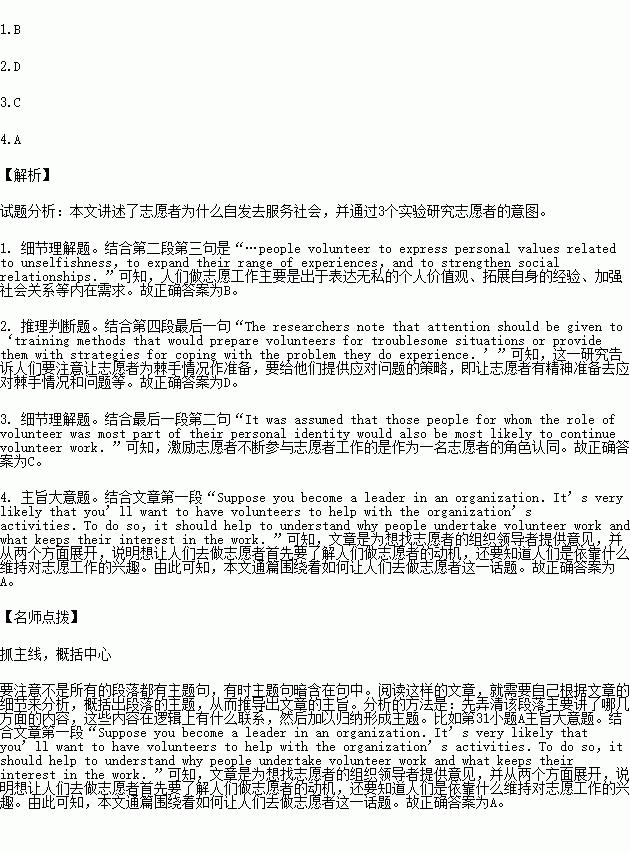题目内容
Suppose you become a leader in an organization. It's very likely that you'll want to have volunteers to help with the organization's activities. To do so, it should help to understand why people undertake volunteer work and what keeps their interest in the work.
Let’s begin with the question of why people volunteer. Researchers have identified several factors that motivate people to get involved. For example, people volunteer to express personal values related to unselfishness, to expand their range of experiences, and to strengthen social relationships. If volunteer positions do not meet these needs, people may not wish to participate. To select volunteers, you may need to understand the motivations of the people you wish to attract.
People also volunteer because they are required to do so. To increase levels of community service, some schools have launched compulsory volunteer programs. Unfortunately, these programs can shift people's wish of participation from an internal factor (e. g. , “I volunteer because it's important to me”) to an external factor ( e. g. ,“I volunteer because I'm required to do so”). When that happens, people become less likely to volunteer in the future. People must be sensitive to this possibility when they make volunteer activities a must.
Once people begin to volunteer, what leads them to remain in their positions over time? To answer this question, researchers have conducted follow-up studies in which they track volunteers over time. For instance, one study followed 238 volunteers in Florida over a year. One of the most important factors that influenced their satisfaction as volunteers was the amount of suffering they experienced in their volunteer positions. Although this result may not surprise you, it leads to important practical advice. The researchers note that attention should be given to “training methods that would prepare volunteers for troublesome situations or provide them with strategies for coping with the problem they do experience”.
Another study of 302 volunteers at hospitals in Chicago focused on individual differences in the degree to which people view “volunteer” as an important social role. It was assumed that those people for whom the role of volunteer was most part of their personal identity would also be most likely to continue volunteer work. Participants indicated the degree to which the social role mattered by responding to statements such as “Volunteering in Hospital is an important part of who I am. ” Consistent with the researchers’ expectations, they found a positive correlation (正相关) between the strength of role identity and the length of time people continued to volunteer. These results, once again, lead to concrete advice: “Once an individual begins volunteering, continued efforts might focus on developing a volunteer role identity... Items like T-shirts that allow volunteers to be recognized publicly for their contributions can help strengthen role identity”.
1.People volunteer mainly out of ________.
A.academic requirements B.social expectations
C.financial rewards D.internal needs
2.What can we learn from the Florida study?
A.Follow-up studies should last for one year.
B.Volunteers should get mentally prepared.
C.Strategy training is a must in research.
D.Volunteers are provided with concrete advice.
3.What is most likely to motivate volunteers to continue their work?
A.Individual differences in role identity.
B.Publicly identifiable volunteer T-shirts.
C.Role identity as a volunteer.
D.Practical advice from researchers.
4.What is the best title of the passage?
A.How to Get People to Volunteer.
B.How to Study Volunteer Behaviors.
C.How to Keep Volunteers’ Interest.
D.How to Organize Volunteer Activities.
 名校联盟快乐课堂系列答案
名校联盟快乐课堂系列答案 黄冈创优卷系列答案
黄冈创优卷系列答案
